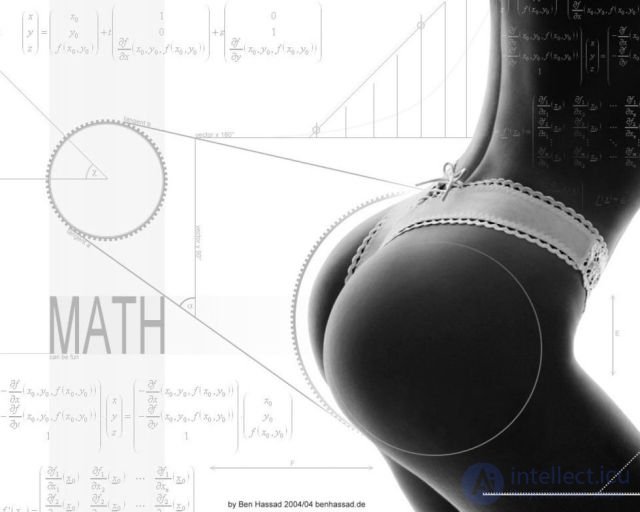Lecture
A programmer, a mathematician and a humanist on an uninhabited island fell ... no, not so.
In the comments to my latest articles I received many different questions and some absolutely wonderful opinions, which I would like to consider in more detail. In general, the question can be formulated as follows: "Should a game designer be a humanities or a programmer? After all, game designers constantly need to consider the balance, the economy, the chances, we need good knowledge of mathematics and the theory of probability. ” And indeed it is. In addition, the game designer needs to understand which of his ideas are realizable (taking into account the qualifications of the team in which he works and the technologies that are used in the development of the game). Moreover, if the answers to the previous questions are positive, he should be able to understand how long it will take to implement the conceived functionality. Does this mean that the "right" game designer should be not only a mathematician, but also a programmer?
Separately, I want to explain for whom this article is written. First of all, it is designed for the game designers themselves or those who so want to start their way to the game dev. But as many employers or gaming startups, as practice shows, reading the text below does not hurt.

But first, let's get an answer to another, deeper question: “what is a game”? There are a lot of books on this topic, a lot of analyzes have been done and there is an incredible amount of formulations that can make a whole book by themselves. For me, the most important thing in games is that they immerse the player in virtual reality, create an imaginary universe, plunging into which the player is there. This is the same as a good book or film, ballet or opera, reading or watching that people forget about the physical around them and find themselves in a fictional. Good and correct games work with the right, the creative hemisphere of a person, give rise to emotions and experiences, thanks to which dopamine is produced and a person experiences happiness. And this is only capable of art, if we are not talking about any physiological effects (for example, narcotic).
And, nevertheless, this does not exclude a methodical and systematic approach to the creation of the game. As in any kind of art, in the game development industry there are certain rules and canons, the violation of which will lead to sad results (more on this later). There is dramaturgy in cinema and literature, harmony in music, and so on. In game it is game design. But, as Jesse Shell, who I love to refer to, quite correctly writes, game design is still very far from becoming a subject or a science. It operates with very inaccurate principles and concepts, half of the decisions are made intuitively, the industry changes every year, and the rules of game design change with it. And although he hopes that someday someone will write something like “game design rules” and game design will turn into a science, for the reasons given earlier, I doubt that this will ever happen. Thus, game design will always be an art, perhaps the most elusive and inaccurate of all now existing.
Now I want to give one of the comments, thanks to which I decided to write this article:
Interesting games in our time to count the fingers. By the word “interesting,” I mean those that make it possible to think, to imagine in your imagination, to put yourself in the place of a hero, to realize what is happening, to memorize in the end for life.Take, for example, the platformer Super Meat Boy (SMB). In my opinion, this is a great toy, which you can pass the time. But only. It is not necessary to dive into it, and in general, the entire game is 95% only the spinal cord working. And there is Braid, having played that I was very impressed. Then he thought: Why?Braid is a story told through great gameplay. But all kinds of art — literature, poetry, music, painting, cinema — tell us something, tell a story. The story of a great feat, meaningful event, or spiritual experience. And each story has a moral that you eventually realize. The essence of the whole story. The purpose for which it was told to us.Games can combine all kinds of arts at the same time. But when the person creating the game has nothing to tell you and me, the cultural value of this game is lost. Just imagine, a person begins to tell you something, describes in detail each explosion and the sound of a falling sleeve, but at the end of the story you don’t really understand anything. Yes, the moral can be quite simple, and maybe after the end of the story the player will have to comprehend what happened in the story and why. Games, like any other kind of art, gives us the opportunity to express themselves in a certain interactive form. And who is rich, he is the one to share. Whoever has nothing to say, he gives out a dummy.Art should not sink to the level of society. Art must pull society up. |
So, I told you how I see games and how I feel about them. Someone probably sees them differently: as a business, as a machine for making money, as a set of mechanics and functionality. And yes, these aspects are also present, but for me and in my opinion they are all secondary. After all, if the game does not fascinate players, carry them away to other realities and universes, then neither any mechanics, nor balance, nor economy, nor effects, nor monetization will work and the exhaust will not give. Just because they will not be claimed. Here you can say: "but what about the games of Zinga, bablososki, which are absolutely empty and just services"? But if you study and explore them, then they immerse their target audience in virtual universes. Yes, they are built according to certain “dark” rules, but this does not make them non-art.

This illustration can, in principle, replace the next paragraph.
Throughout the previous section, I wrote that game design in game development is an art. Probably, it might have formed an opinion that the text that game designers should be humanities, creative personalities, and so on will follow. Maybe it will be so, but first let's see what game designers do at work. Our main responsibilities (somewhere can be added or removed different items, depending on the game being developed):
As you can see, it turned out thirteen points. If you try, you can bring their number up to one hundred, but I think the main tasks of the game designer on the project are covered. I can not say which item is the most important of them - they are equivalent, but about the last, the thirteenth, I want to consider a little more. He is the most vague and most incomprehensible to most developers, because he works entirely with the right hemisphere of the brain.
What is it all about - harmony in game development? I see it as an understanding of what fits perfectly into the concept of the game, and what is foreign and that will destroy the immersion of players in the game atmosphere. This is an understanding of what is suitable for the game and what is not; that will complement and expand the gameplay, and that it will break or make it less exciting, valuable and exciting.

For example, in the video for the crowdfunding campaign of the game '' Biscot 6 ″ on IndieGogo, after beautiful space landscapes and man-made interface, a video suddenly begins with a beautiful and sexy girl in a bikini standing on the beach and telling about the game. Understand me correctly, girls are beautiful, they can decorate anything. Even my blog, which would not be so beautiful without properly selected images. But everything has its time and place, this approach does not work everywhere. What would work a lot better in the case of this video? The same girl, maybe in a no less sexy suit, tight-fitting, but in a space theme. Drawing a space background and putting it on a green background is not a problem for such developers, and getting a costume is not difficult (especially in the USA). Why was this not done? Most likely because such things are not obvious and intuitive for them, and logic rules the ball. Indeed, from the point of view of logic, everything is correct: the players of the cosmo-game are 90% male, the age is exactly the one in which they have a huge lack of sex with a surplus of desire. Show naked beauty that turns off their rational thinking and ask for help should work. And it would have worked if it had not destroyed previous expectations, the atmosphere and the mood of the audience.
And here is the second comment, because of which I wrote this article:
By the way, yes, I would agree about harmful mathematics. I myself am doing well with math, and the more enraged when, at the next interview of 10 questions, 9 are devoted to my mate. base.Mathematics, the ability to write texts and plot, knowledge of specialized software - it's all just tools. The best are considered by programmers, the writers write, the producers understand the market. Gaydesigner is distinguished by the ability to create FAN! And this is really something akin to art, the ability to feel the game and the understanding of what needs to be screwed so that it all turns from a heap of pixels into a living world.And when at the interview the head of the company is a former programmer who thinks that the State Duma is such a writer of formulas and algorithms, then this is quite regrettable. Due to overly discrete thinking, these people cannot understand why the DG is really needed. |
I agree with this exactly 50%. I believe that for a professional game designer basic knowledge is required. But this does not mean that a game designer should have a mathematical education. On the contrary, I would not (probably) take this job, because I consider game design as a creative profession, and I refer game people (right) to people of art. But you need to know the basics, because when developing a balance / economy you have to work a lot with forums; much to prototype independently in Excel, which in turn can have tens of pages and thousands of rows / columns. And as can be seen above, in the list of duties of a game designer, at least five points require such knowledge and skills.
From personal experience. I had a funny case when I calculated an action in the game on the principle of rock-paper-scissors. Three classes took part in the action; each class had 4 basic parameters: strength, agility, endurance, and life. In the Excel everything came together perfectly, but the programmer could not realize more than a month and came to the conclusion that the task could not be realized. Then we replaced this programmer and another implemented the boogie in the way I needed in a week. What would happen if I did not have the necessary knowledge and skills, if I did not personally create a prototype and would not be convinced that the system can work? The programmer would convince that the system is impossible and the game would be completely different.
This includes items with game balance, economy and monetization. Almost always, they require the ability to make basic formulas or to build graphs, to make prototypes, and to see how the mechanics conceived work. The same knowledge is often required for working with programmers and drawing up technical tasks for them. Yes, you can put all this on them, describing them in general terms, but in this case you shouldn’t be surprised if the game comes out (if it comes out) is not at all what the game designer came up with. Or, God forbid, the customer / investor / business owner.
When developing a game, thinking over functionals, a game designer must clearly understand whether his ideas are realizable within his team and technology or not. This means that he must ... have a basic knowledge of programming, or at least scripting. This does not mean that he should be able to sit down and write a piece of the game, or a script. No, as well as mathematics, I would not take such a job (if it is not John Romero, of course). But to know the principles of programming, algorithms, I think it is necessary. Why?
Because if you set an unrealizable task for programmers, there will be no game. Instead, there will be a bunch of failed deadlines, money thrown away and a lot of pain and frustration. On the other hand, there are also situations when programmers can try to scare to frighten maliciously overstated deadlines: “well, it will take half a year ...”. Sometimes this may be true, sometimes - an attempt to manipulate and lobby their interests. For example, the programmer simply does not want to do the routine work or (the most dangerous case) he wants to make his game and the vision of the game designer does not fit there. Another reason for the false overstatement, which I encountered quite recently - the reluctance to work with another programmer, because I would have to delve into his code and his style of writing code that turned out to be the first programmer is not close.
If you do not have a basic understanding of programming, then such problems will either not be solved, or the solution may be fatal for the entire project.
Finally, I will tell the story of my first gaming startup, almost fifteen years ago. Somewhere I have already talked about how I got into the industry - I was asked to help write a script (the words of the design document did not yet exist) for “Confrontation 2”, which rolled into a swamp. I did not write the script, but we gathered with the leading developers from there and began to make our game - a titanic RPG, as it should be for beginners who dream of world domination. We appointed the chief (producer, but we did not even know that word) in the team of the ex-lead programmer “Opposition”. He is a really great programmer, an intelligent person, and works internationally. And it was our biggest mistake, which led to the collapse of the team.
The problem turned out to be that he was a logician and a programmer who does not understand illogical actions or decisions. We wrote the script in which there was a romantic component. The history of the world was tragic - plague, dare, inquisition; the main character's favorite is on the other side of the plague cordons, in the infected zone. And the hero had to go there, save his beloved, risk his life and overcome all sorts of difficulties. However, this scenario was hacked by the producer because it is ... illogical. "The hero will not go there, but he understands that he will die there" - and in no way explain that for the sake of love people act illogically, they did not succeed. The script corresponded time after time until it satisfied the producer, in which everything was logical and justified. However, after reading it, the producer said that the script is boring. And indeed, there were no emotions and life in it; it was a logical, empty story.

I think that by 50% he should be a humanist, with the specialty of a screenwriter or director, 15% a psychologist, 15% a mathematician, 10% a programmer / scriptwriter, and the rest - to taste. At least, if we created a character in any game, then I would distribute the skills that way. Therefore, my answer is that at least half of the game design should be humanitarian. I do not believe in game designers or producers who have "grown up" from programmers. Of course, there are exceptions, but I have not seen such (successful) live ones yet.
Хорошая новость тут заключается в том, что все эти скиллы можно достаточно быстро прокачать, если действительно есть желание стать сильным геймдизом. А для руководителей хорошая новость такая, что на собеседованиях наличие этих скиллов очень легко проверить.
На этом все, кто дочитал до конца — молодец! Комментарии, вопросы дополнения горячо приветствуются, как и шаринг этой статьи, если она вам понравилась.
Статья вызвала бурную критику, как положительную, так и отрицательную. И это понятно, она затрагивает за живое многих людей из индустрии. Я бы хотел выделить несколько наиболее интересных и спорных комментариев и ответить на них здесь, чтобы не распыляться по десяткам форумов и сетей.
Это довольно смешной комментарий, который меня позабавил. Потому что во-первых это не так: среди звезд геймдизайна есть и спортсмены, и экономисты, и инженеры, артисты. Во-вторых, звезд на планете не так много, чтобы их примеры имели бы какой-то вес в общей статистике мира. Да и исключения есть, о чем я говорил выше.
Во-вторых, времена давно уже изменились. В те игры, которые принесли славу нынешним звездам, сейчас большинство играть не сможет, и дело не в графике. Дело в том, что изменились сами люди, их восприятие, ожидания, понимание мира. Вместе с тем игровая индустрия выросла, изменилась, усложнилась, стала более профессиональной и требовательной. Что происходит с человечеством в целом можно почитать Д. Пинка «A Whole New Mind: Why Right-Brainers Will Rule the Future«, который очень доступно об этом рассказывает и приводит конкретные доказательста и аргументы. Поэтому двадцать лет назад, когда специальности геймдиза еще не было, кто-то должен был придумывать игру. И 99% из них остались никому неизвестными, исчезнувшие в далеком прошлом, никому не нужные поделки. Выбились в топовые игры единицы, и по ним строить картину мира просто наивно.
Касательно роли геймдиза на проекте. Если это профи, то аналогично режиссеру в кино, его задача — целостность игры. Я пока что не видел, чтобы режиссер подчинялся сценаристу. Поэтому правильный геймдизайнер будет принимать работу сценаристов или браковать ее (если они есть в компании); то же самое будет и с артом, если он не вписывается в проект (не смотря на присутствие в нем арт-директора, если такой есть); кодом и всем прочим, включая заказчика, если есть на то причины. Для того, чтобы оценивать, подходит ли что-то игре, правильный геймдизайнер должен обладать различными и разнообразными скиллами, указанными выше. И если он был когда-то программистом, то следует задать вопрос: почему он им быть перестал, не потому ли, что он по складу ума на самом деле гуманитарий? И далее уже смотреть, получится ли из него хороший геймдиз, или его ум уже потерял пластичность и он мыслит в основном логическим образом и слишком структурно.
Comments
To leave a comment
Computer games developming, game-design
Terms: Computer games developming, game-design